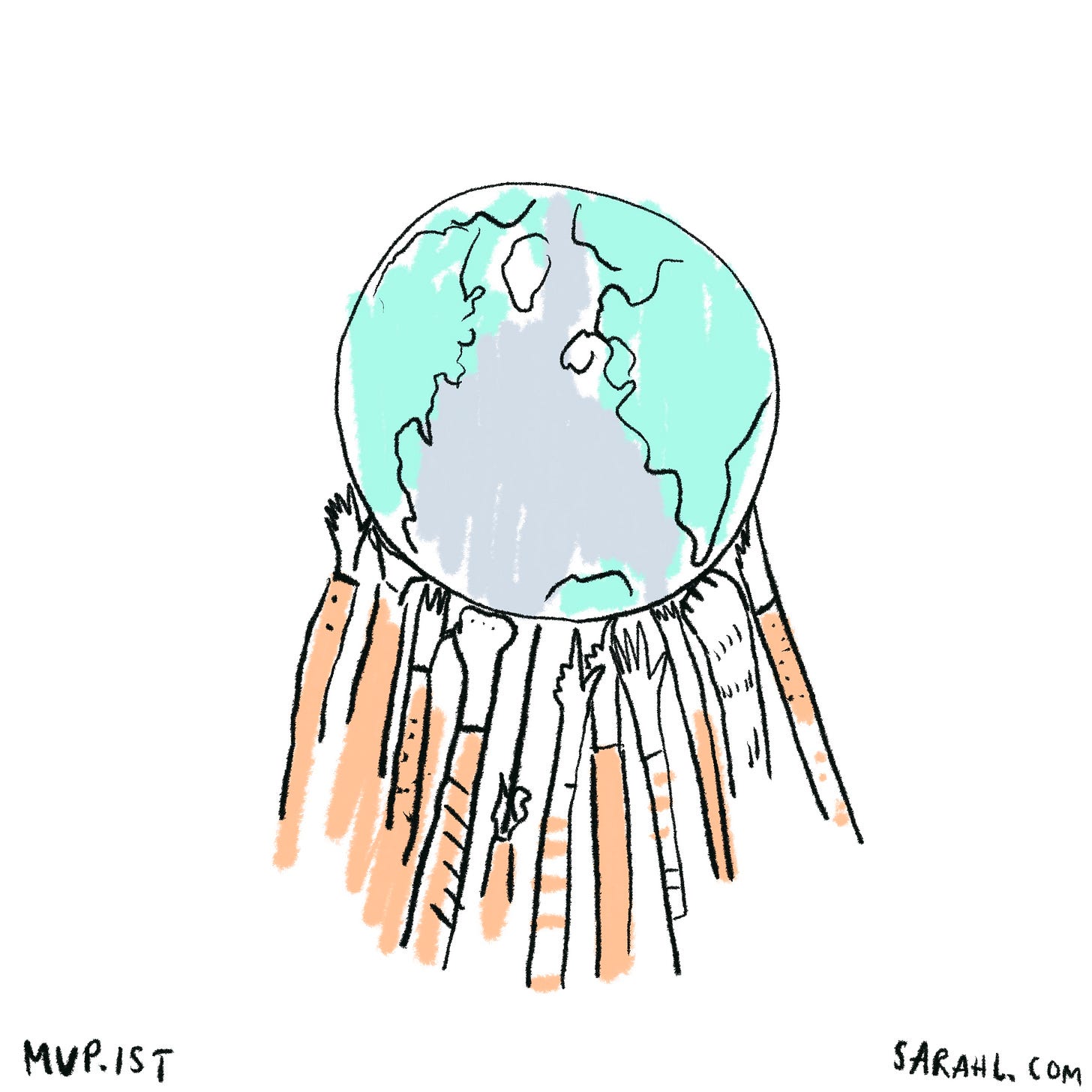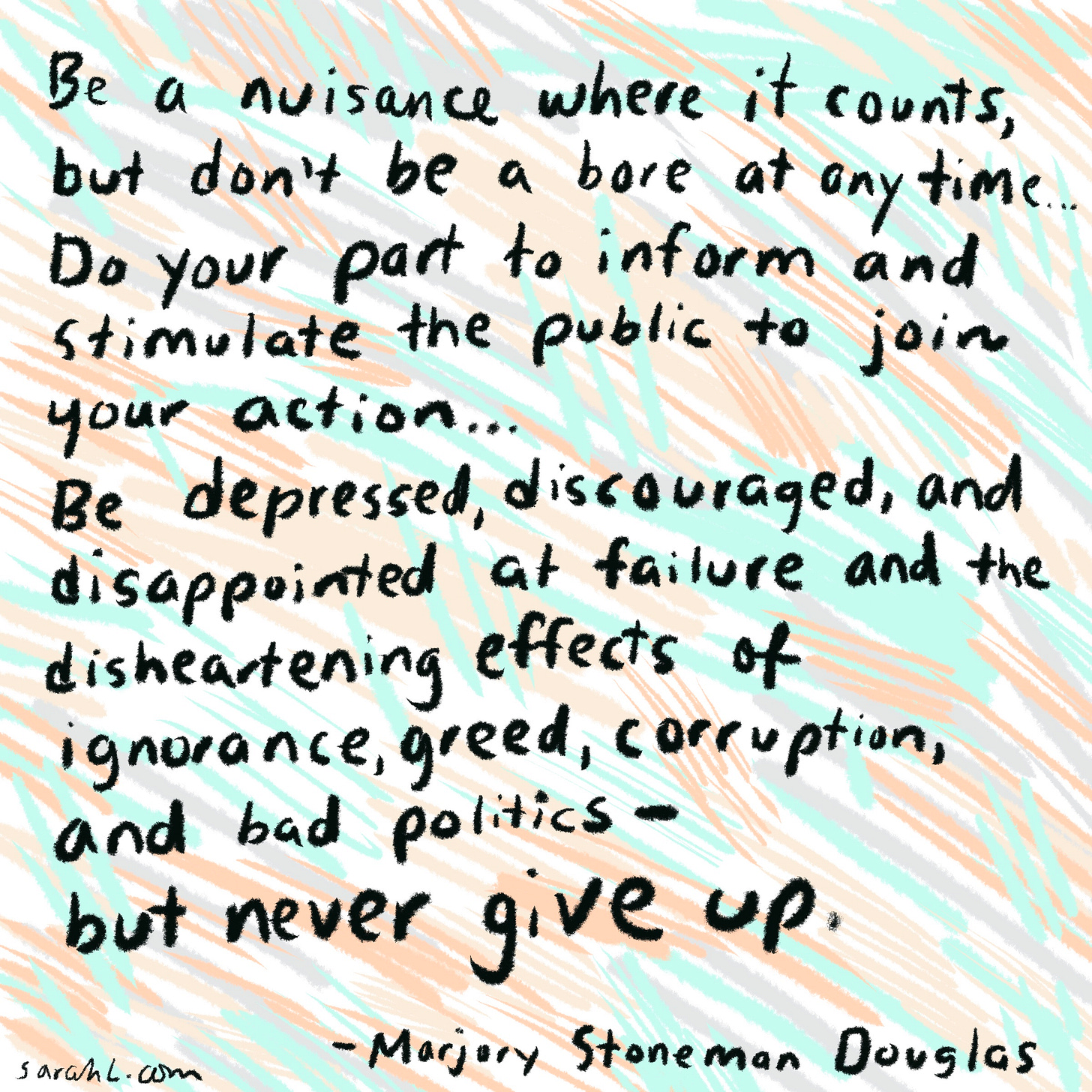X marks the rot
Got an extra shoulder or two?
My friend Rebecca and her son recently guinea pigsat for us. She texted me the cover of our New York magazine when it arrived and we both laughed, because print in the age of digital means we’d discussed the ridiculous cover story two weeks ago (Nepo babies! Who the heck cares!), and I reminded myself all over again that I should cancel some of our print pubs, for emissions and brain preservation, both. But New York mag redeemed itself with this week’s cover story, a first-person essay by the incredible Parkland shooting survivor and March for Our Lives organizer, X González (formerly Emma).
When the shooting at Marjory Stoneman Douglas High School happened, it shocked me. Because I’d grown up not too far from this high school. (Here’s a visual essay I drew about the MSD student activists and the legendary environmental activist MSD herself in Yes!) The students of Parkland spoke beautifully, organized incredibly, and achieved some significant legislative wins on gun legislation. For a few short months, I even thought they might be the ones to stop the horror once and for all. Yes, I’m at times naively optimistic, despite my almost four decades on this spinning rock!
González and her friends David Hogg and Cameron Kasky became fixtures on my Twitter timeline, along with two dads, Fred Guttenberg and Manuel Oliver, whose children had been killed in the shooting. I marveled at González, a brilliant and unflinching speaker and activist. And then I stopped seeing her around the internet.
The piece explains her painful trajectory over the past few years, and the toll activism takes. It can be grueling work, all the more so for someone who came to it from profound trauma. X writes beautifully about this experience, but the facts are numbing. It is very hard to be an activist today, especially a young one. Nothing is off limits, and the cruelty of humanity is evident in the treatment she experienced. It’s further grist for the argument I made in last week’s top 10 — leave the kids alone! Writes Gonzalez:
A white-haired man who had clearly had a few drinks came up to me. With all the positivity in the world, he clapped me on the shoulder and said, “Well, it’s on you kids now; we fucked it all up, and now it’s your job to fix it.” How nice that must have felt for him, or for the countless people who would, in the coming years, say exactly the same thing to me, offloading the capacity to make change to us as a way of absolving themselves of their own role in America’s problems. How much pressure fell squarely on my shoulders with every hand that rested there, telling me to fix this problem, to take this chance and run with it.
I am glad that González has since found a bit of quiet, but sad that the only option was to step back, and worried about a world that crushes people so heartily, forcing them to choose between activism and personal health. Watching Greta Thunberg being harassed this week was horrific. She deserves better. González deserves better. Both deserve our thanks. But more importantly, both deserve that we share the load, or, more precisely, that we take the load.
What is the solution here? My only ever-present vision is a shared burden of vocalization. The world is a heartbreaker, but in dispersing the cruelty and heaviness, the weight on each brave set of shoulders gets lighter. We must pick up that weight from younger generations and spread it across all of us, even those of us who grew up not thinking of ourselves as activists. The metaphor that comes to me is that of the sleepover party magic trick in which we, puny 11-year-olds, all of us, would be able to collectively rise up one of our minions, with just a few fingers of support each. How did we do this? Distributed effort. Ten mood-ringed hands manifesting their strength. And hopefully not dropping Jennifer S. to the floor.
The concept of distributed effort animates me. I recently reread Marisha Pessl’s Special Topics in Calamity Physics, a book I loved when it came out for the mystery embedded within all the references and overly poetic pyrotechnics. The mystery centered (yes, I’m giving a bit away here, but it came out in 2005, so I’m reasonably confident you’re not going to read it) around the idea of distributed acts of violence to sabotage those who would destroy the planet for profit. But no one person is culpable, because everyone is only fulfilling a harmless directive, delivered in a silo, absent a picture of the full puzzle. I’m told the film version of How to Solve a Pipeline wrestles with this conceit too, though I’ve yet to see it.
But whether the aim of distributed support is radical human protection or radical pipeline sabotage, the idea is the same — a diffusion of strength and effort to protect people and planet. Especially in a world where status quo power can exact targeted, concentrated harm on individuals.
I like this idea because it builds community as it protects it, it develops movements as it guards individuals. And I like the idea of inspiring people to activism through this necessity to share the emotional and physical burden, because it’s strong enough to pull those who are sometimes scared (me!) into action in ways that staid calls for support sometimes just cannot. For X, yes, I will do more.
I also like the idea of distributed effort because, even absent the crushing weight of public expectation or vitriol, we are all just too stretched to take on so much. In a slightly vexing conversation with Sarah Wilson in which I disagreed with almost as much as I agreed with (yes, your personal emissions do matter!!!), I was captivated by Seth Godin expressing that no single person created his recent Climate Almanac. Instead, it’s the living embodiment of a million creators working in distributed concert. Distributed Content Creation. Cool. Yes, I know Wikipedia has existed for decades, but this is climate-y creative collaboration.
Of course, this week, with talk of gas bans and taking things away, I was once again reminded of the sharp wisdom of the strategist Anat Shenker-Osorio, who succinctly articulates my belief that progressives have to talk less of negatives and takeaways and more of positives and benefits, so the frame here is not to ask people to absorb some of the shocks directed at kids, but to contribute their strength to this important, collaborative work that will bring us all so much shared safety, health, and happiness. And don’t forget to bring good snacks.
How can we share the climate work? How can we take on the weight to a much more meaningful extent? Almost every day I encounter someone who wants to get into climate, as a job (every job is a climate job!), or in their life, community, sphere of influence. It’s inspiring because you can see the weight redistributing, the energy gathering, the shared momentum building. Now we just need 200,000 more drum lines.
This planet
What will you shoulder? Let a frizzy-haired lady know.
Last planet: Top Ten
Thank you J for this infuriating example of how bonkers it is to offload this burden onto kids:
Thank you for mentioning how disturbing it is when people say that the kids will save us. First of all, wtf? How about WE do something rather than waiting for young people to do it? Second of all, when did it become the responsibility of children to SAVE THE WORLD?
Here's an anecdote: When my now-teen daughter was about six, we went to the library to sign up for the summer reading program. The librarian handed her the little notebook, the stickers, etc., and then she handed her a slip of paper and said "and this is where you write down what you're going to do to save the earth."
I was livid. My daughter was six and DID NOT NEED TO SAVE THE EARTH. Sorry, I'm totally losing it right now. Anyway, thanks again for pointing this out because as much as I absolutely adore Greta and all the others, I do not think we should be looking to children to save us!
Stuff
Give the climate kids money! (This is awesome, Tom!!!) Pivot Green is launching our first annual Canadian Youth Climate Action Award. This award along with an honorarium of $1500 (and two runner-up prizes of $500 each ) will be awarded to the group that best meets our criteria for having an impact on climate change. Details of the award are in the attached letter along with a link to our site for submissions. We believe that young Canadians deserve to be supported and recognized for their contributions. Applications for the Award will be accepted until the closing date of March 25, 2023. Award recipients will be announced on Earth Day 2023.
What climate change requires of economics - It’s essentially a Just Transition argument, so needless to say, yes, please. (Project Syndicate)
Thank you, Alix, for sharing this Rebecca Solnit beauty, a must read! Why we need new stories. (The Guardian)
And have you been following the gas story? Here’s a cheeky video we made at Rewiring America that demos the absolute superiority of induction cooktops.
People dancing
It’s a little Disney, but I’m a sucker for a subway dance.
As always, thank you for reading! Let me know when I get it wrong or right, and always share your ideas and hilarious puns with me. Hope you are happy and healthy!
Have a beautiful weekend,
Sarah





